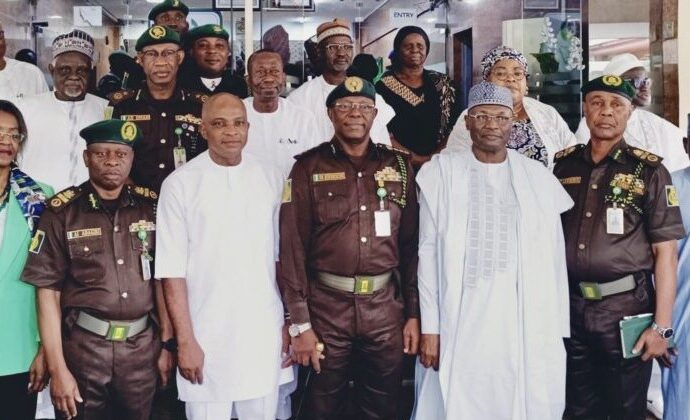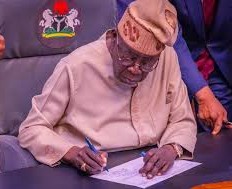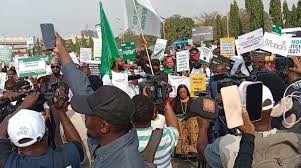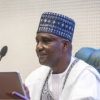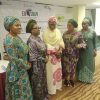A current topic in the reform of the Nigerian electoral system is the potential inclusion of inmates in the voting population for the 2027 general elections and the process for implementing this change. This issue has led stakeholders to discuss how the proposal could be carried out, considering the logistical challenges previously experienced in recent
A current topic in the reform of the Nigerian electoral system is the potential inclusion of inmates in the voting population for the 2027 general elections and the process for implementing this change. This issue has led stakeholders to discuss how the proposal could be carried out, considering the logistical challenges previously experienced in recent national elections.
In August 2025, INEC worked with the Nigerian Correctional Service to help eligible inmates vote in the upcoming general elections, pending approval of electoral laws.
INEC Chairman Professor Mahmood Yakubu and NCoS Comptroller General Sylvester Nwakuche referenced recent court rulings that grant inmates the right to register and vote, noting that both institutions are developing plans to implement this significant change in Nigeria’s voting system.
Prior to INEC and NCoS working together, the 9th Senate acted to allow inmates to vote. On March 8, 2022, the Senate passed a resolution urging INEC to enable registered prisoners to vote in general elections and to set up voting centres in custodial facilities nationwide.
Many people and stakeholders see allowing inmates to vote as a sign of progress, but there are concerns about how it will be implemented and whether INEC can overcome the challenges involved.
Inmate Voting: A Milestone for Nigeria’s Electoral Inclusivity
Providing more space for inmates in correctional centres demonstrates progress toward democratic development and greater inclusion of minority groups in the country.
Inmates in Nigeria are excluded from voting, despite previous court rulings allowing it; this remains a key issue for stakeholders in Nigerian democracy.
Yiaga Africa’s recent publication, “Democracy Behind Bars: Bridging Legal and Policy Gaps For Inmate Voting in Nigeria,” highlights that Nigeria has excluded 81,406 incarcerated individuals from electoral participation. Of this population, 28,306 have been convicted, while the remaining 53,100 are awaiting trial. As a result, these individuals are not permitted to take part in the country’s essential democratic process of voting for their preferred candidates.
The publication reports that many Nigerian adults are unable to vote, not because of legal rulings, but due to executive and legislative inaction. Most inmates are legally innocent yet cannot vote in any election, even though there is no law explicitly banning their participation.
The finding contrasts with the assumption that a democratic country will uphold the fundamental human rights outlined in its constitution and ensure inclusive participation in electoral activities, as required by the Electoral Act.
Including inmates in the voting system promotes democratic inclusion and supports rehabilitation by recognising their civil rights and aiding their reintegration into society.
Also, it is worth noting that since voting is a fundamental human right that should not be taken away from citizens, including inmates, especially those awaiting trial, who are presumed innocent is a way to ensure that the country is following the tenet of democracy as it demands.
Barriers to Inmate Voting Implementation
While INEC has started making an active move toward the inclusion of inmates in the voting system, according to the constitution and the principles of fundamental human rights, some challenges are likely to serve as barriers to the inclusive move. These factors cannot be overlooked and are likely to set the progressive back in no time if not addressed.
Logistics and Security
One of the recurring issues during both general and off-cycle elections has been logistical challenges. The electoral commission has made regular commitments to organise credible elections, but local and international observers have noted instances where essential logistics were not provided on time.
Including inmates among voters presents new logistical challenges for the electoral commission, such as organising prison voter registration, managing transfers, and ensuring secure voting.
Security concerns may hinder the implementation of inmate voting. With Nigeria’s correctional centres often overcrowded, security agencies would need to increase efforts to protect voters and ballot boxes.
Manipulation Potential
Nigeria’s electioneering process, based on previous observations of the independent bodies, has scored low in the aspect of integrity and credibility, as politicians have used different antics to lure voters into voting for their political parties through vote buying and different kinds of inducements.
There are concerns that political actors may attempt to influence election outcomes by encouraging prison officials to sway inmates’ voting preferences, which could affect the integrity of the electoral process.
Ambiguities of Legal Provision of Inmate Voting
Although court judgments and constitutional provisions affirm that all Nigerian citizens possess the right to vote, there is a lack of clear legal guidance regarding the enfranchisement of inmates. Additionally, the Electoral Act 2022 does not specifically address the eligibility or ineligibility of inmates to participate in elections.
Another ambiguity lies within the provision of law for the inmates who are awaiting trial, and they are eligible to vote. Since these laws are not clear, national legislation defining which categories of inmates can vote can become a barrier to the implementation.
Can INEC Overcome These Barriers?
The electoral commission faces challenges implementing inmate voting, but there are practical steps INEC can take to promote inclusive democratic development.
Given this context, INEC should drive institutional reform by establishing a dedicated desk for inmate voting and regularly monitoring correctional centres nationwide.
Amendment of the Electoral Act
The electoral commission should work with stakeholders and the National Assembly to amend the Electoral Act 2022, clarifying the legal position on inmate voting and addressing current ambiguities.
Addressing the Logistical Barrier
In addition to addressing inmate voting, INEC is responsible for resolving logistical challenges encountered during elections. INEC should systematically address all logistical requirements for effective implementation.

